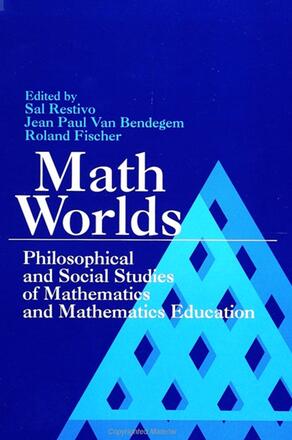
Math Worlds
Philosophical and Social Studies of Mathematics and Mathematics Education
Alternative formats available from:
Description
An international group of distinguished scholars brings a variety of resources to bear on the major issues in the study and teaching of mathematics, and on the problem of understanding mathematics as a cultural and social phenomenon. All are guided by the notion that our understanding of mathematical knowledge must be grounded in and reflect the realities of mathematical practice.
Chapters on the philosophy of mathematics illustrate the growing influence of a pragmatic view in a field traditionally dominated by platonic perspectives. In a section on mathematics, politics, and pedagogy, the emphasis is on politics and values in mathematics education. Issues addressed include gender and mathematics, applied mathematics and social concerns, and the reflective and dialogical nature of mathematical knowledge. The concluding section deals with the history and sociology of mathematics, and with mathematics and social change. Contributors include Philip J. Davis, Helga Jungwirth, Nel Noddings, Yehuda Rav, Michael D. Resnik, Ole Skovsmose, and Thomas Tymoczko.
Sal Restivo is Professor of Sociology and Science Studies at Rensselaer Polytechnic Institute. He is the author of The Social Relations of Physics, Mysticism, and Mathematics; The Sociological Worldview; Mathematics in Society and History; and Science, Society, and Values: Toward a Sociology of Objectivity. Jean Paul Van Bendegem is Professor of Philosophy and Logic at Vrije Universiteit in Brussels, and editor of the journal Philosophica. He is the author of Finite, Empirical Mathematics: Outline of a Model, and co-editor of Theory and Experiment. Roland Fischer is University Professor of Mathematics at Interuniversitares Forschungsinstitut fur Ferstudien in Klagenfurt, Austria. He is co-author of Mensch und Mathematik, and founder of the Journal of Mathematik-Didaktik.
Reviews
"Philosophy of mathematics has become a major area of interest for philosophers and historians of ideas in the last few years; and the swing has been toward examining the social context and processes involved in mathematics rather than taking it as a transcendent body of truths. This book is very up to date in this respect. It will prove to be the cutting-edge statement on the sociological approach to mathematics on both philosophical and theoretical issues, and it sets a new goal for reforming mathematical education. " — Randall Collins, University of California, Riverside